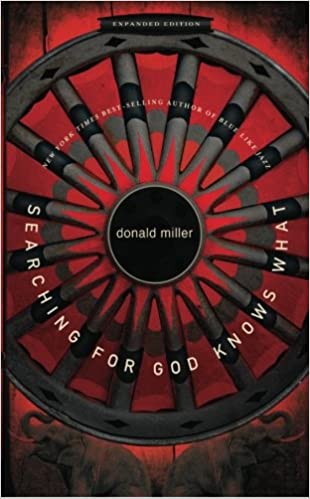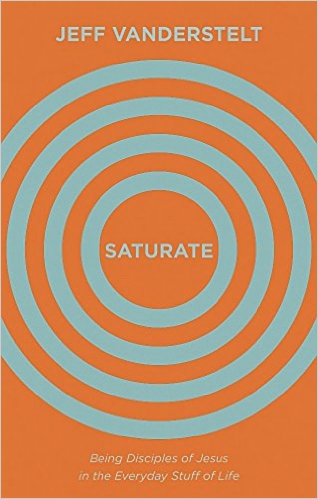Christianity has become a formula for success in life or a list of rules to be obeyed. It has become a culture war, a “we are right, you are wrong” sort of thing. The story of God’s love has become scientific and intellectual. Somehow it has been reduced to a set of bullet-point propositions to be affirmed and defended.
All this, of course, is not good; a perversion of the original intention. Christianity, at its core, is a love relationship with God brought about when the grand story of Jesus captures one’s heart.
The story that answers best, the deepest longings of the human heart, is the true one.
Miller continually circles back to his illustration that life is like being stuck in a lifeboat; the only way you can stay in the boat is by proving your worth through struggle, effort and cunning. There is no belonging in the lifeboat, only survival, that’s life. This bleak vision of reality stinks, and that’s Miller’s big idea. It doesn’t resonate. Which sends him off to search for a better story, a vision of reality that fits more perfectly with humanity’s deepest desires. This search brings him to Christianity. Through Jesus, we belong, we are loved. Lifeboat living can go away. Unfortunately, the Christian religion has, in many ways, become another form of lifeboat living, perhaps an even more brutal one.
Miller says:
If Christianity is all about following a formula to get on the nice list and stay off the naughty lists then “it doesn’t interact with the great desire of my soul” (45)
Christianity is no longer appealing because it’s lost its centre as fundamentally relational. If that can be recovered than the Christian story
“speaks directly into this most basic human need we are feeling, then the gospel of Jesus is the most relevant message in the history of mankind (45)
When Noble prize-winning writer Toni Morrison, was asked what talents she had developed to become such great writer she said
“Oh, no, that is not why I am a great writer. I am a great writer because when I was a little girl and walked into a room where my father was sitting, his eyes would light up. That is why I am a great writer. That is why. There isn’t any other reason.” (128)
If God’s love for humanity is something along these lines, then there is no question I want in. Miller continues to press home the importance of human desire in the search for faith in God.
What if when we are with God, we feel that we have glory, we feel His love for us and know, in a way infinitely more satisfying than a parent’s love or a lover’s love, that we matter? (p. 109)
That’s the longing of every human heart — The Christian story attaches itself to that longing, which makes it better. The problem for chronic doubters like me is the relational connection to God remains abstract. The experiential piece so necessary to a healthy relationship feels largely absent. I guess that’s why longing for it makes up such a massive part of what it means to have faith. The desire is genuine, it’s real even if the experience isn’t.
And here we stumble into another problem. In his final illustration, Miller masterfully connects the Christian story to the story of Romeo and Juliet. The love of these two compels them to abandon their families for a new life together. Death itself is preferable to life without being together. This great love symbolizes the love which Christianity envisions existing between God and humanity, but for that to happen:
There can be no doubting, no mistrust; one must have complete faith in the other that nothing is being held back. (p. 226). Anything less than this complete trust from Romeo would not be love, (p. 226). A person must be willing to be dashed on the rocks or made the fool in exchange for a relationship in order for pure love to take place.
And that’s a bit depressing for me. I remain connected to God. I love the story; I believe it. But the relationship remains elusive, and I’m riddled with doubts.
Good Quotes:
It makes you wonder if guys like John the Evangelist and Paul and Moses wouldn’t look at our systematic theology charts, our lists and mathematical formulas, and scratch their heads to say, Well, it’s technically true; it just isn’t meaningful. (p. 57).
But the greater trouble with these reduced ideas is that modern evangelical culture is so accustomed to this summation that it is difficult for us to see the gospel as anything other than a list of true statements with which a person must agree. (p. 153).
When the church began to doubt its own integrity after the Darwinian attack on Genesis 1 and 2, we began to answer science, not by appealing to something greater, the realm of beauty and art and spirituality, but by attempting to translate spiritual realities through scientific equations, thus justifying ourselves to culture, as if culture had some kind of authority to redeem us in the first place. (p. 160).
Morality as a battle cry against a depraved culture is simply not a New Testament idea. (p. 186).
God is not in the business of brokering for power over a nation; He is in the business of loving the unloved and pulling sheep out of crags and bushes. (p. 194)
I like your style: Miller made me laugh out loud several times. His description of Santa taking a leak was one such time.
“his red suit, his white beard coming down his belly, his loud, echoing belch coming off the walls, his spread-legged stance and the way he looked straight up at the ceiling as he shook the dew off the lily, as they say. (p. 22)

A God with hurt feelings and a bad temper?
Miller attempts to describe how God must have felt in the garden after Adam and Eve betrayed him. It must have been “Terribly painful” for God, he says, a real heartbreaker. God must have felt like a buddy of his from Baltimore, whose wife cheated on him. Sad and then very angry.
“You wouldn’t think God would forgive them at all. You would think God would just kill them (83), and then he attempts to equate Adam and Eve’s misstep in the garden to what terrorists do to innocent people today. God becomes the tragic victim of human atrocity. At which point, I began to check out. This is no better story. Is there another way to look at this? I hope so because a relationship with one so easily offended and short-fused is both impossible and undesirable.




